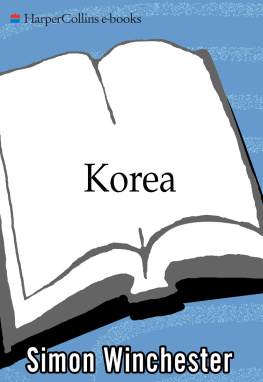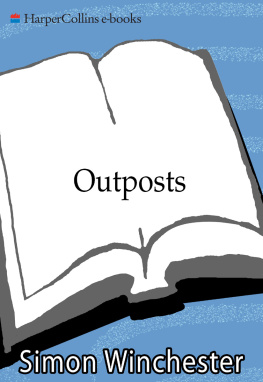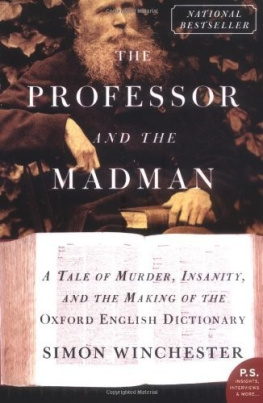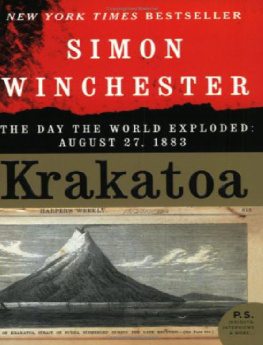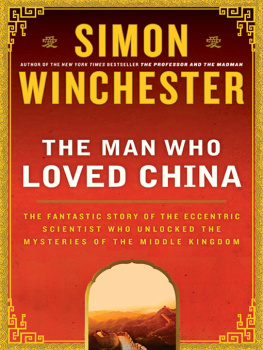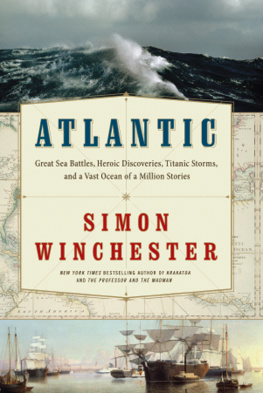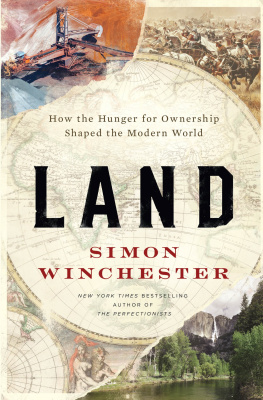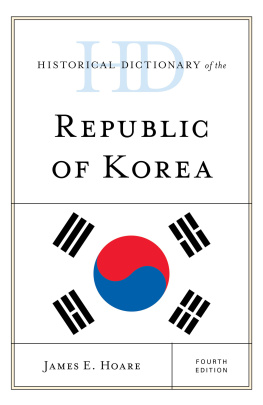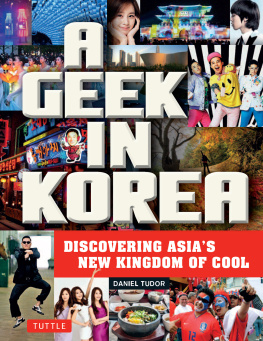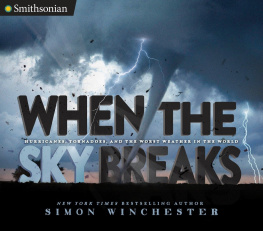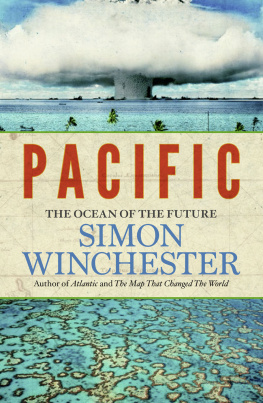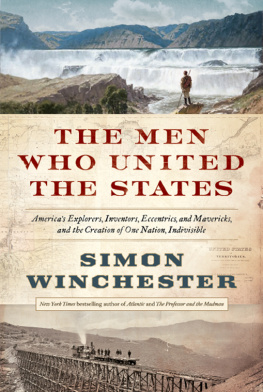Korea
A Walk Through the Land of Miracles
Simon Winchester

For P.W.
Contents
In the Seamens Wake
The Irish Island
The Boat Country
Memorial to a Massacre
A Time for Meditation
With the Peacekeepers
The Roots of the Nation
Seoul CitySoul City
To the Borderline
The inspiration for this book came from Miss Park Choon-sil, the interpreter who showed me around Seoul on my first visit in the late summer of 1985. Miss Park said many times that she was eager that her country, so little known abroad and of such uncertain reputation, should be better and more sympathetically understood out in the English-speaking world. My present hope is that this very modest account, born of her initial suggestion, should go some way towards realizing her wishes.
Philip Wetton, then the commercial counsellor at the British Embassy in Seoul, and a man well disposed towards and hugely knowledgeable about Korea, was equally keen that a kindly book about this country should be published in the West, and he was generous to a fault with advice, contacts, and constructive criticism. Both Philip Wetton and George Robinson, who also lived and worked in Seoul, read the typescript and made innumerable helpful suggestions. I owe a very considerable debt to both of them, though they are in no way responsible if any errors or misjudgements escaped their scrutiny: that responsibility, of course, is my own.
Both Cathay Pacific Airways and the Seoul Hilton Hotel were kind enough to provide support for the venture; and in ways other than the purely practical, David Bell of Cathay Pacifics parent company, The Swire Group, and Christian Schuecking, Siegbert Beller, and Mrs S. H. Ahn of the Hilton were immensely helpful.
During my weeks on the road I met scores of people who were invariably curious to know why I was walking and, when I told them, were in a variety of ways helpful or supportive or botha glass of water here, the offer of a lift there, a shared lunch in a field in one province, a few glasses of soju in a roadside drinking stall in another. To all of this vast anonymous band, my sincerest thanks.
But others I do know by name, and so to all of them, my gratitude for helping with what turned out to be a most pleasurable mission: Ian Buruma, Chang Kyung-soon, Sangon Chu, the Columban Fathers, Roger Crabb, Paul Ensor, James Fenton, Billy Fullerton, Brigadier Tim Hackworth, Max Hastings, Adrian Hill, Christopher Hitchens, Peter Hyun, Kim Dae Jung, Ko Seouk-young, Lt. Joe LaMarca, Lee Seong Cheol, Hwi J. Lee, the Reverend Pat Lohan, Gavin Mackay, Boyd McCleary, Ferris Miller, Michael OBrien, Oh Kyoung-sook, Birgit Schwarz, Shin Hyun Gook, Edwin Shum, Lucretia Stewart, Bob Sweeney, Yvonne Townley, Max Whitby, and Paul Whitelaw.
I am most grateful to my old friend Dennis Foreman, Librarian at the Journal , Newcastle upon Tyne, for his very welcome information on shipbuilding in North-East England.
I wish in addition to thank both Philip Pochoda, my editor in New York, and Lois Wallace, my agent there, for their support and for their sustained belief that Korea, so little known in the West, should in fact be written about.
My family, of whom I saw too little during my Korean spring and summer, were as delightfully helpful as ever: my gratitude to them all is incalculable.
Some while after this book was published, and once the brief excitement generated by the Seoul Olympic Games had stilled and in doing so had helped return Korea to the shadows to which it remains accustomed, I received a letter, postmarked Kwangju.
It was from an Irishman, a Columban Father, a spiritual colleague of the Patrick McGlinchey whom I had befriended on the island of Cheju. He had read the book, wrote kindly and flatteringly about what he saw as its worthier sections but also said he recognized in its structure and ambition one major shortcoming. The traditional pilgrims journey through the Korean peninsula, he wrote, invariably began near the 6,400-foot summit of the Cheju-do peak known as Halla-san, close to where mine indeed had begun; it ended by custom 600 miles further north on the summit of the equally spiritually regarded and rather higher (at 9,022 feet) peak known as Paektu-san. But to Paektu-san I had apparently not been. Had not even set foot. Had not come within a hundred miles, in fact. What merit, he asked with rectorly solicitude, could there possibly be in a journey that was only half complete?
I replied with rather tired courtesy. Paektu Mountain, known in Chinese as Baotou Shan, lies exactly astride the frontier that demarcates the Peoples Republic of China from the nation known properly as Chosun Minchu-chui Inmin Konghwa-guk , and which translates as the Democratic Peoples Republic of Korea. Or less grandly, North Korea, the closed, forbidden, Stalinist nightmare-state to which few are admitted and none generally wishes to return. While it might not technically be very difficult to gain access to the slopes on the Chinese side of Baotou Shan, I wrote, it would be well-nigh impossible to win access at all to any part of the mountain that lay on the North Korean side. And as for the summitwell, I replied, not even divine intervention could possibly transport me there.
He sent back a polite note. Yes, getting to the mountaintop might well be difficult, he conceded. It also might be tricky , as he put it, to get access to North Korea at all. But had I tried? Might it not be worthwhile to at least have the briefest of peeks inside the state that lay between China and South Korea, and which so aggressively and unremittingly lay claim to the entire peninsula, and which wished so loudly and so forcefully to impose its rule upon it? Would going there not add some symmetry to a story which, said the Father with rueful precision, had of now a somewhat partisan perspective?
His remarks, kindly meant as they were, needled me. I had long wondered what would have happened if I had walked across the Bridge of No Return and into the Democratic Republic that late spring day, when the months of northbound walking recounted in this book had brought me to the frontier village of Panmunjom. There had been, after all, a black limousine waiting for me that day, just across the border. Two men, North Korean agents of some kind, had apparently been sent to collect me. The ceaselessly blaring propaganda loudspeakers were telling such as might listen that a westerner, just arrived at the Bridge, had travelled the entire length of the country on foot, too poor to afford a car: the limousine had been sent as a courtesy to make the next stage of my journey, into Kim II Sungs legendary workers paradise, just a little more comfortable.
I see that in my account I recorded the American sentries with me as saying only that, had I decided to accept, they would have tried to persuade me not to cross. The bookish decorum of the time persuaded me to omit the violence of their actual response, which was, in its essence, that if I made any attempt to pass them and step on to the narrow walkway across the weedy ooze of the Konshan River, they would most certainly break my legs . So I stood my ground, gazed wistfully northwards for a while and finally turned back into the welcoming embrace of the South. The guards sighed with relief. The journey was, so far as I was concerned, formally over.
But as I say, the priestly comments in that letter from Kwangju, written some months after I had left, irked me. I knew that eventually, and for my own sake, let alone that of the book and its story, I had to go back and visit the North. And in due course (and with the grant of a visa prised from an unsmiling official in a grimy consulate in Macau, a place where rum things quite unobtainable in nearby Hong Konglike a North Korean entry visa, price $600were always marginally easier to come by), I did go, and became sufficiently fascinated by the place that over the next ten years I went back a further two times, eventually reaching a sufficient familiarity with the traffic-less streets of Pyongyang that I could find my way around the capital with some ease. It turns out to be a much simpler city in which to navigate than is Seoulnot least because, essentially, there is nothing there . It is a lifeless place, a silent mausoleum of a city peopled only, it seems, with stick-like automatons, figures from a Lowry painting with whom a visitor is permitted no communion.

